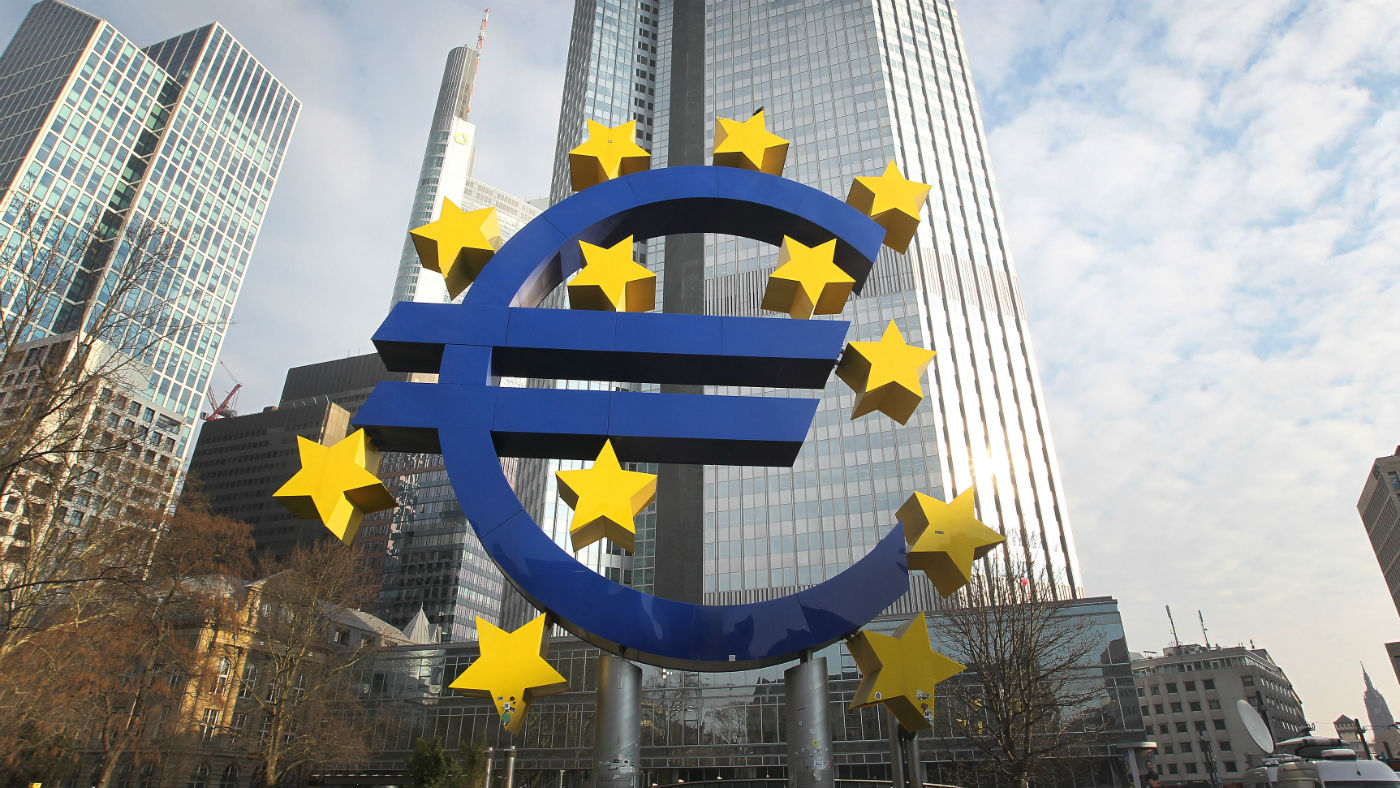Eurozone economy shrinks at record rate
Fears of deep recession piles pressure on EU governments to agree trillion-euro bailout programme

A free daily email with the biggest news stories of the day – and the best features from TheWeek.com
You are now subscribed
Your newsletter sign-up was successful
The eurozone economy shrank at its sharpest rate on record in the first quarter of the year, with the continent set to enter a deep recession triggered by the coronavirus lockdown.
Eurostat data published yesterday showed that eurozone GDP shrank by 3.8% in the first quarter of 2020 compared to the final quarter of last year. The contraction is worse than that experienced by the US over the same period and deeper than the financial crisis over a decade ago. Market Watch says it means “three years of the eurozone’s economic activity have been wiped away, and it is likely going to get worse”.
“The collapse in economic activity was most acute in countries hit hardest by the disease,” says CNN.
The Week
Escape your echo chamber. Get the facts behind the news, plus analysis from multiple perspectives.

Sign up for The Week's Free Newsletters
From our morning news briefing to a weekly Good News Newsletter, get the best of The Week delivered directly to your inbox.
From our morning news briefing to a weekly Good News Newsletter, get the best of The Week delivered directly to your inbox.
In France, GDP declined by 5.8% in the first three months of the year, Spain saw a contraction of 5.1% while Italy’s economy shrank by 4.7%. All three countries have recorded more than 20,000 coronavirus deaths making them among the worst affected countries in the world.
There was some good news for Europe’s largest economy. Germany has not yet published its quarterly estimates but new figures for the German labour market showed the number of people out of work rising by 373,000 in April.
“However, the full impact is damped by the country's system of financial help to people put onto shorter working hours, known as Kurzarbeit,” says the BBC, without which these “bad” labour market figures would have been “disastrous” Claus Vistesen of Pantheon Macroeconomics told the broadcaster.
–––––––––––––––––––––––––––––––For a round-up of the most important stories from around the world - and a concise, refreshing and balanced take on the week’s news agenda - try The Week magazine. Start your trial subscription today –––––––––––––––––––––––––––––––
A free daily email with the biggest news stories of the day – and the best features from TheWeek.com
Europe's economy “is expected to fall even further in the second quarter, given that most European governments only started to impose a lockdown on households and businesses in early March” says the Financial Times, which adds the pandemic “is expected to trigger the worst recession in the global economy since the Great Depression of the 1930s”.
European Central Bank (ECB) President Christine Lagarde has said that a sharp downturn in eurozone economic activity in April “suggests that the impact [of the pandemic] is likely to be even more severe in the second quarter”.
She warned that eurozone economic growth could fall between 5% and 12% this year, “depending crucially on the duration of the containment measures and the success of policies to mitigate the economic consequences for businesses and workers”.
The ECB has already stepped up with a commitment to buy more than €1 trillion worth of bonds and other assets this year, “but the dire first quarter data, and the prospect of worse to come in the April to June period, will pile pressure on EU governments to finalize plans for a trillion-euro recovery fund to rebuild their economies,” says CNN.
-
 The ‘ravenous’ demand for Cornish minerals
The ‘ravenous’ demand for Cornish mineralsUnder the Radar Growing need for critical minerals to power tech has intensified ‘appetite’ for lithium, which could be a ‘huge boon’ for local economy
-
 Why are election experts taking Trump’s midterm threats seriously?
Why are election experts taking Trump’s midterm threats seriously?IN THE SPOTLIGHT As the president muses about polling place deployments and a centralized electoral system aimed at one-party control, lawmakers are taking this administration at its word
-
 ‘Restaurateurs have become millionaires’
‘Restaurateurs have become millionaires’Instant Opinion Opinion, comment and editorials of the day
-
 Epstein files topple law CEO, roil UK government
Epstein files topple law CEO, roil UK governmentSpeed Read Peter Mandelson, Britain’s former ambassador to the US, is caught up in the scandal
-
 Iran and US prepare to meet after skirmishes
Iran and US prepare to meet after skirmishesSpeed Read The incident comes amid heightened tensions in the Middle East
-
 Israel retrieves final hostage’s body from Gaza
Israel retrieves final hostage’s body from GazaSpeed Read The 24-year-old police officer was killed during the initial Hamas attack
-
 China’s Xi targets top general in growing purge
China’s Xi targets top general in growing purgeSpeed Read Zhang Youxia is being investigated over ‘grave violations’ of the law
-
 Panama and Canada are negotiating over a crucial copper mine
Panama and Canada are negotiating over a crucial copper mineIn the Spotlight Panama is set to make a final decision on the mine this summer
-
 Why Greenland’s natural resources are nearly impossible to mine
Why Greenland’s natural resources are nearly impossible to mineThe Explainer The country’s natural landscape makes the task extremely difficult
-
 Iran cuts internet as protests escalate
Iran cuts internet as protests escalateSpeed Reada Government buildings across the country have been set on fire
-
 US nabs ‘shadow’ tanker claimed by Russia
US nabs ‘shadow’ tanker claimed by RussiaSpeed Read The ship was one of two vessels seized by the US military